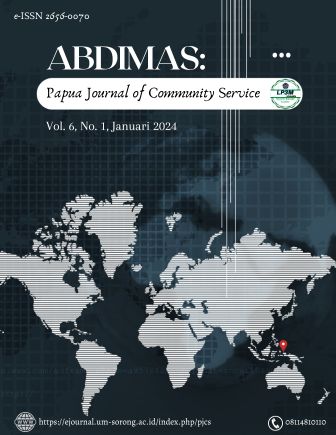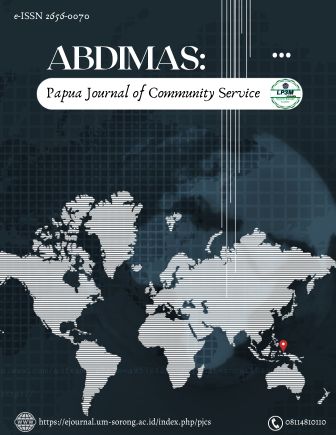Pelatihan Pemanfaatan Internet untuk Menunjang Kreativitas Guru dalam Penyampaian Materi secara Daring
DOI:
https://doi.org/10.33506/pjcs.v6i1.2749Keywords:
mathematics; online training; SD; ICT; websiteAbstract
References
Abidah, A., Hidaayatullaah, H. N., Simamora, R. M., Fehabutar, D., & Mutakinati, L. (2020). The Impact of Covid-19 to Indonesian Education and Its Relation to the Philosophy of “Merdeka Belajar.” Studies in Philosophy of Science and Education, 1(1), 38–49. https://doi.org/10.46627/SIPOSE.V1I1.9
Adrián, N., Ayala, R., Mendívil, E. G., Salinas, P., & Rios, H. (2013). Kinesthetic Learning Applied to Mathematics Using Kinect. Procedia - Procedia Computer Science, 25(25), 131–135. https://doi.org/10.1016/j.procs.2013.11.016
Alliyah Nurul Jannah, N., Muttaqin, A., & Sultan Ageng Tirtayasa Jalan Raya Jakarta, U. K. (2021). Pengembangan bahan ajar daring berbantuan platform edmodo pada materi perbandingan, JPMI (Jurnal Pembelajaran Matematika Inovatif), 4(4), 857–866. https://doi.org/10.22460/JPMI.V4I4.P853-862
Annur, M. F., & Hermansyah, H. (2020). Analisis Kesulitan Mahasiswa Pendidikan Matematika dalam Pembelajaran Daring pada Masa Pandemi Covid-19. Paedagoria : Jurnal Kajian, Penelitian Dan Pengembangan Kependidikan, 11(2), 195–201. https://doi.org/10.31764/PAEDAGORIA.V11I2.2544
Ekayana, A. . G. (2011). Pemanfaatan internet sebagai salah satu sumber belajar siswa dan guru di jurusan teknik elektronika SMK Negeri 2 Depok Sleman.
Febrianto, P. T., Mas’udah, S., & Megasari, L. A. (2020). Implementation of online learning during the covid-19 pandemic on Madura Island, Indonesia. International Journal of Learning, Teaching and Educational Research, 19(8), 233–254. https://doi.org/10.26803/IJLTER.19.8.13
Friantini, R. N., & Winata, R. (2019). Analisis Minat Belajar pada Pembelajaran Matematika. JPMI (Jurnal Pendidikan Matematika Indonesia), 4(1), 6. https://doi.org/10.26737/JPMI.V4I1.870
Handayani, S., Halidjah, S., Vilda, D. A., Program, G., Pendidikan, S., Sekolah, G., Fkip, D., & Pontianak, U. (2021). Deskripsi kemampuan guru membuat bahan ajar. Jurnal Pendidikan Dan Pembelajaran Khatulistiwa (JPPK), 10(3), 1713–1720. https://doi.org/10.26418/JPPK.V10I3.46061
Hartami, Y. (2020). Pemanfaatan TIK dalam pembelajaran abad 21 di sekolah dasar.
Hernawati, K. (2015). Integrasi Teknologi Web 2.0 dalam Pembelajaran Matematika. http://khanacademy.org.
Leonard, J. (2019). PENGENALAN DASAR INTERNET.
Mutiasari, D., Siska, R. R., & Salelenggu, N. R. (2020). Peranan E-Learning Dalam Pembelajaran Matematika. PROCEEDING UMSURABAYA, 0(0). https://journal.um-surabaya.ac.id/index.php/Pro/article/view/4338
Peranan TIK dalam Proses Pembelajaran Matematika di Sekolah - Pendidikan Matematika. (n.d.). Retrieved April 18, 2023, from https://pmat.uad.ac.id/peranan-tik-dalam-proses-pembelajaran-matematika-di-sekolah.html
Tenriany, A., & Nadjib, M. (2016). Pengenalan teknologi internet melalui program mobile pusat layanan internet kecamatan (MPLIK) kemkominfo bagi siswa menengah kejuruan (SMK) di kabupaten Barru. Jurnal Komunikasi KAREBA, 5(1), 146–158. https://journal.unhas.ac.id/index.php/kareba/article/view/1890/1055
Yulianto, D., & Mujtahid, N. M. (2021). Online Assessment during Covid-19 Pandemic: EFL Teachers’ Perspectives and Their Practices. JET (Journal of English Teaching), 7(2), 229–242. https://doi.org/10.33541/JET.V7I2.2770

Downloads
Published
Issue
Section
License

This work is licensed under a Creative Commons Attribution-ShareAlike 4.0 International License.
Authors who publish with this journal agree to the following terms:
Authors retain copyright and grant the journal right of first publication with the work simultaneously licensed under a Creative Commons Attribution-ShareAlike 4.0 International License. that allows others to share the work with an acknowledgment of the work's authorship and initial publication in this journal.
Authors are able to enter into separate, additional contractual arrangements for the non-exclusive distribution of the journal's published version of the work (e.g., post it to an institutional repository or publish it in a book), with an acknowledgment of its initial publication in this journal.
Authors are permitted and encouraged to post their work online (e.g., in institutional repositories or on their website) prior to and during the submission process, as it can lead to productive exchanges, as well as earlier and greater citation of published work

Papua Journal of Community Service is licensed under a Creative Commons Attribution-ShareAlike 4.0 International License



